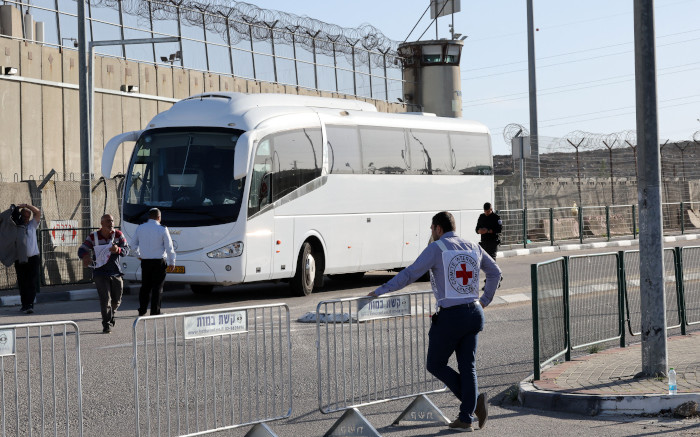
A first tranche of 13 women and children hostages were due to return to Israel on Friday as part of a deal after weeks of talks between Israel, Palestinian militant groups, Qatar, Egypt and the United States.
An International Red Cross bus parks in front of the Ofer military camp near the occupied West Bank city of Ramallah on November 24, 2023, after transporting Palestinian prisoners from three Israeli prisons. A four-day ceasefire began in the Israel-Hamas war on November 24 with the release of hostages in exchange for Palestinian prisoners. Image: AHMAD GHARABLI / AFP
JERUSALEM – Hamas said a group of hostages seized in the deadliest attack in Israel’s history were handed over on Friday as a temporary ceasefire prevailed in Gaza after weeks of fighting.
“Half an hour ago the prisoners were handed over to the Red Cross, which will take them to the Egyptians,” a source close to Hamas at the Rafah border crossing told AFP.
A source in Hamas’s military wing confirmed the handover, adding: “This is the first group under the agreement.”
A first tranche of 13 women and children hostages were due to return to Israel on Friday as part of a deal after weeks of talks between Israel, Palestinian militant groups, Qatar, Egypt and the United States.
Israel is expected to release three times as many Palestinian prisoners from Israeli prisons – women and teenagers.
A dozen Thai hostages kidnapped during Hamas raids in Israel on October 7 were also released on Friday, Thailand’s Prime Minister Srettha Thavisin announced.
Images released by the Israeli army showed bright pink and blue headphones lying on the seats of a helicopter ready for the released hostages, along with toys and teddy bears waiting at a reception center where they were being taken.
At least 50 hostages are expected to be released during a four-day ceasefire, leaving an estimated 190 in the hands of Palestinian militants.
In return, 150 Palestinian prisoners are expected to be released.
On October 7, Hamas breached the militarized border between Gaza and Israel, killing about 1,200 people and taking around 240 Israeli and foreign hostages, according to Israeli officials.
‘GO HOME’
The pause in fighting sparked a mass movement of thousands of Gazans who had sought refuge in schools and hospitals from the relentless Israeli bombardment that began after Hamas militants’ Oct. 7 attacks.
“I’m going home,” 16-year-old Omar Jibrin told AFP after emerging from a hospital in the southern Gaza Strip where he and eight family members had sought refuge.
In Khan Yunis, in the southern Gaza Strip, where many Palestinians have fled, the noise of war has been replaced by a cacophony of car horns and ambulance sirens.
For Khaled al-Halabi, the ceasefire is “a chance to breathe” after almost seven weeks of war.
Halabi had sought refuge in Rafah but comes from Gaza City in the north, much of which has been reduced to rubble.
Israel’s retaliatory air, artillery and sea attacks, as well as a ground offensive, have killed about 15,000 people in Gaza, according to the Hamas government.
The people of Gaza are struggling to survive due to a lack of water and other essential supplies. Shortly after the ceasefire began at 7:00 a.m., trucks carrying more aid, including fuel, gas and food, began entering the Gaza Strip from the Rafah border crossing into Egypt.
Jens Laerke, spokesman for the United Nations humanitarian agency OCHA, expressed hope in Geneva that the pause “leads to a longer-term humanitarian ceasefire for the benefit of the people of Gaza, Israel and beyond.”
He reiterated the need for access to the entire Gaza Strip, particularly in the north, “where the damage and humanitarian needs are greatest.”
An estimated 1.7 million of Gaza’s 2.4 million residents have been displaced by the fighting, according to the United Nations.
Now thousands of them are trying to get home.
In Khan Yunis, they loaded belongings onto carts, strapped them to car roofs or slung bags over their shoulders and pushed through the streets to return to their homes from shelters.
Israeli warplanes dropped leaflets warning people that the war was not over and it was “very dangerous” to return north, the focus of Israel’s military campaign.
The ceasefire was also a chance for some Palestinians to return to Gaza via the Rafah border crossing.
Some gunfire appeared to be heard in the morning and dark clouds of smoke rose periodically over the northern Gaza Strip, an AFPTV live camera showed, but the ceasefire appeared to be holding in the afternoon.
Further north, on the Lebanese-Israeli border, calm returned after regular deadly exchanges of fire, especially between the Israeli army and Hezbollah. The Lebanese movement, like Hamas, is supported by Iran.
CAREFULLY PREPARED
Ziv Agmon, legal adviser in Israeli Prime Minister Benjamin Netanyahu’s office, told reporters that the hostages would be received individually or in groups by the International Committee of the Red Cross, taken across the border and handed over to the Israeli army.
They would be flown to Israel from El-Arish in Sinai, an Egyptian security source said.
The Israeli soldiers had been carefully prepared to receive potentially deeply traumatized women and children.
After medical examinations, the former prisoners will be able to call their family members before being reunited later in Israeli medical facilities, Agmon added.
AFP has confirmed the identities of 210 of the approximately 240 hostages.
At least 35 of those arrested were children, 18 of whom were ten years old or younger at the time.
Hamas had previously released four women and Israeli forces had rescued another. Two more prisoners, including a female soldier, were found dead by Israeli troops in Gaza.
Netanyahu’s office said it had received “an initial list of names” of those to be released and was in contact with the families.
Maayan Zin, whose eight- and 15-year-old daughters Ela and Dafna are among the hostages, posted on social media platform X that she had been told their names were not listed.
“This is incredibly difficult for me; I long for her return,” she wrote.
Palestinian prisoners in Israeli prisons will also be released on Friday, Qatari Foreign Ministry spokesman Majed Al Ansari said.
The Palestinian Authority Prisoners Commission released a list of unnamed Palestinian inmates – 24 women and 15 children – who could be released in exchange for the first hostages.
Palestinian prisoners will be freed from three prisons in Israel and the Israeli-occupied West Bank and then taken by bus to the Ofer military camp, an Israeli official told AFP on condition of anonymity.






Recent Comments